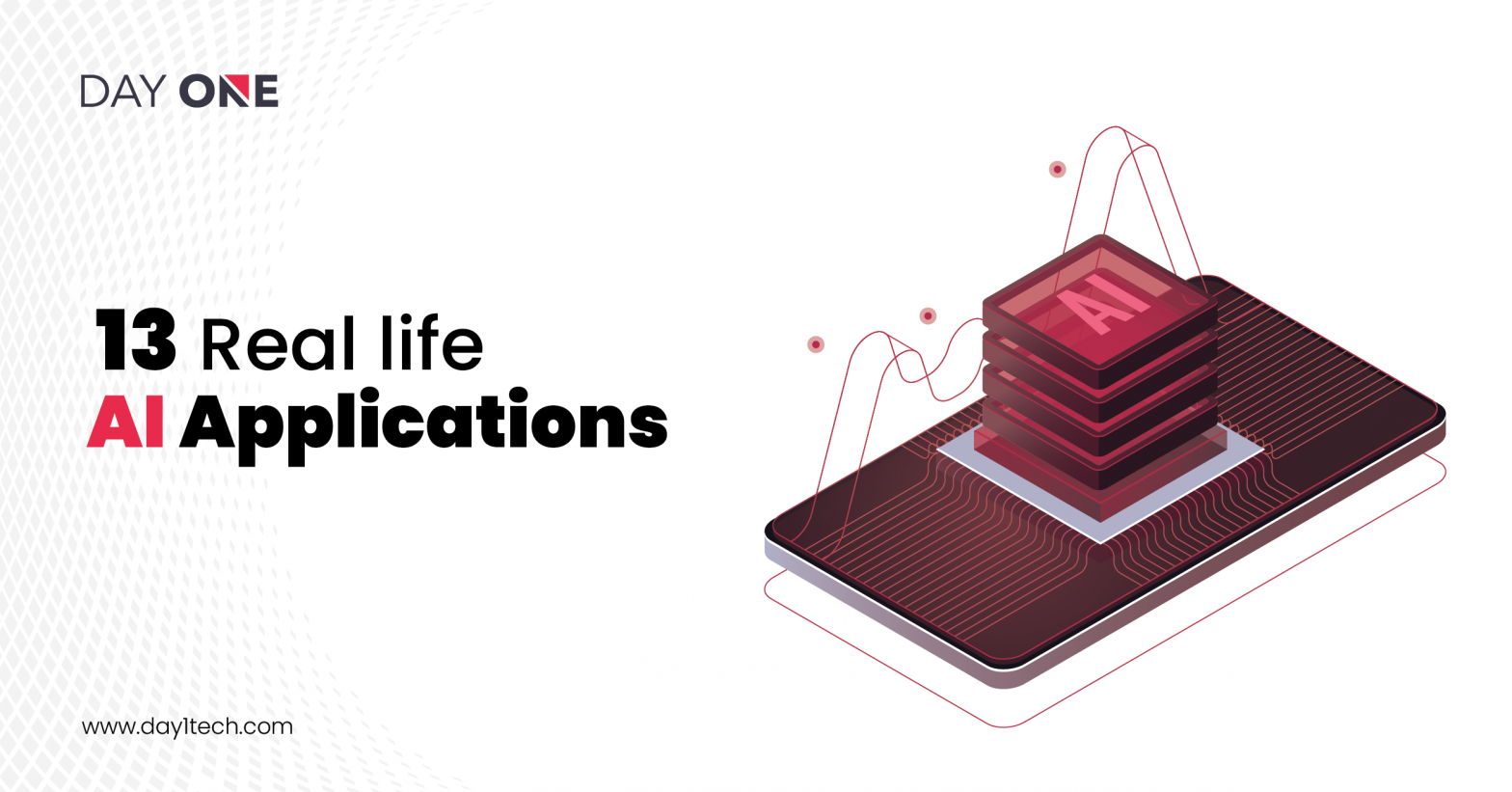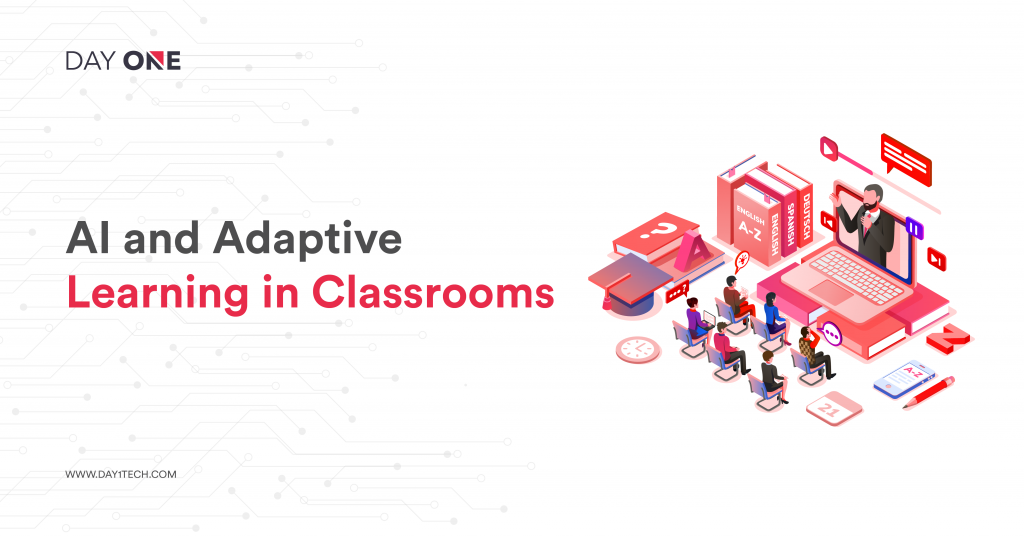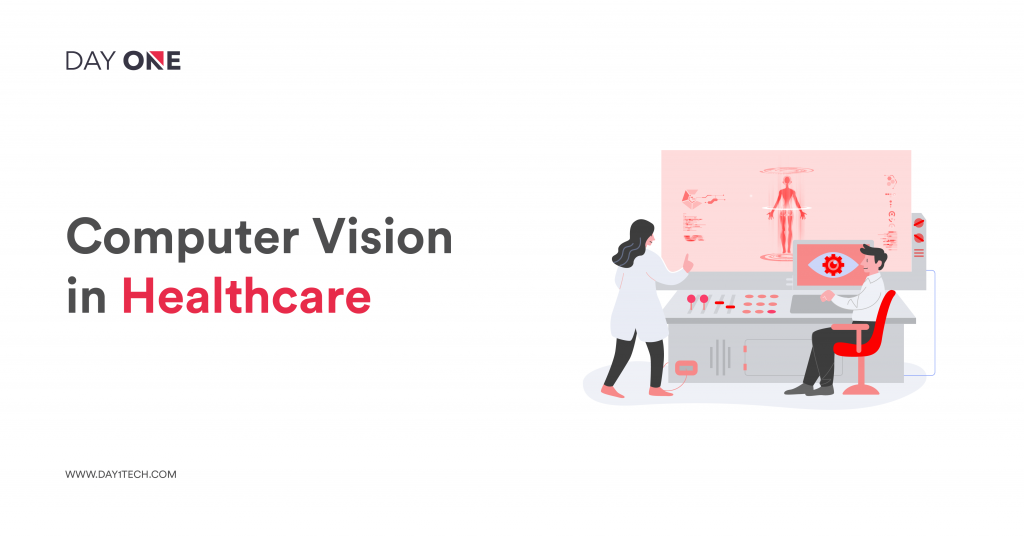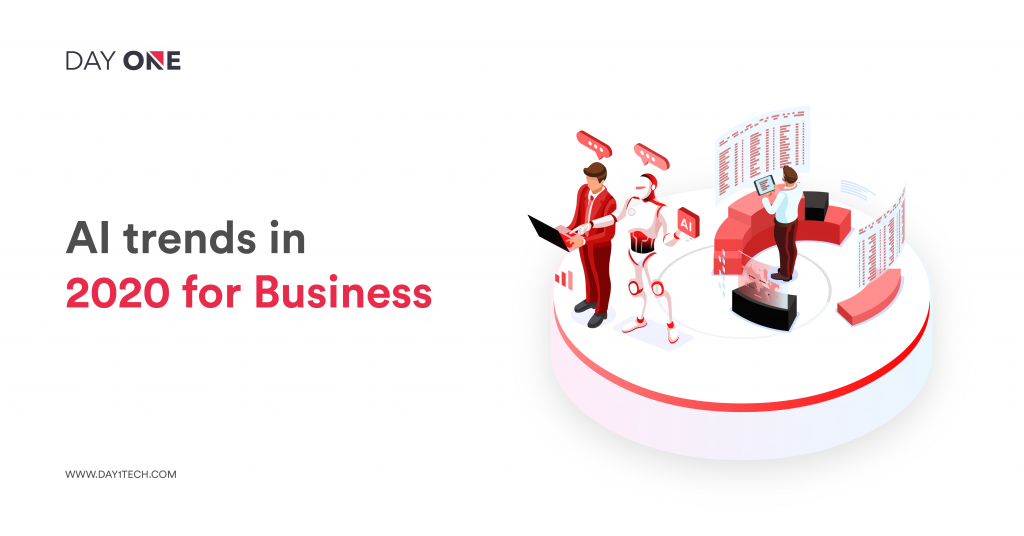13 Real life AI Applications
admin
Artificial Intelligence
August 4, 2021
9 min read

The word AI or Artificial Intelligence brings an overwhelming sense of achievement technology-wise, with something that is always a part of the future. The dream of AI also seems much distant for most, given how AI’s image is only linked to tech giants or technology and business circles.
But, what if you were told AI is very much now and has already paved a secure way into your daily life? Let us learn a little about Artificial Intelligence, followed by the real-life applications of AI.
What is Artificial Intelligence?
AI, in broad terms, refers to the stimulation of human-like intelligence in machines that are not merely programmed to mimic human actions but also think like one. What’s more, the term is also inclusively used to refer to any machine that exhibits other traits linked with the human mind, including problem-solving, analyzing, comprehending, and learning.
The prime objective behind Artificial intelligence is to have capable enough technology that could rationalize and carry out actions to present results that are brilliantly close to the desired goal or defined operation, if not precisely the same.
The application of AI today is wide-ranging from industries, such as healthcare to automobiles and even finance. And, more often than not, people remain unaware that the technology that accompanies them regularly is, in fact, AI in action or, better said, AI in everyday life.
AI applications in real life
Traveling and Navigation
From Apple and Google maps to ride-sharing apps such as Ola and Uber, even the commercial plane you board are all hugely AI-dependent.
Google maps or any other navigation apps or providers in that matter utilizes artificial intelligence to interpret hundreds and thousands of location points to provide you with the real-time route, weather conditions, directions, traffic status, and more.
Similarly, factors like cost and car size when hiring a car service such as Ola or Uber are also determined using AI software.
As for commercial flights, the AI-driven auto-pilot feature plays a significant role in managing the cockpit workload for pilots, enhancing both your experience and safety.
Online shopping
One would often come across a certain product as a recommendation on shopping sites and other platforms and think to themselves, just how does their smartphone know them better than most people around. Well, guess what? It is not your smartphone but AI again.
Personalizing users’ experience is increasingly becoming an integral marketing tactic and for all the right reasons so, with improved sales and better customer relationships being the evident benefits of the same.
It is especially true for all the e-commerce stores, given how they are among the biggest platforms to successfully implement the personalization domain of Artificial intelligence.
The latest AI application focuses on utilizing AI-powered algorithms to curate an efficient list of buying recommendations and filtering them to meet the user’s interest.
Since telepathy is out of options for even the most advanced of technology, the recommendations you see are often the result of your own searches and activity online. There are two main steps in how AI carry out the task –
- Collecting the user’s data from their previous interactions or search history on the site.
- Curating a list of similar or useful products using the data, to be precise, something that will catch the users’ eye with the highest odds of being purchased.
Amazon recommendations make for a perfect example of a successful AI application in E-commerce.
Agriculture
The agriculture industry is in a bind to find a better and more innovative approach to increase crop yield given the many issues, including climate change, food security concerns, and population surge.
Besides maximizing the yield in the same land share, the sustainable use of resources is the only way to manage the increasing demand for food and manage climate crises. And let me tell you it is a fact with more precise data stating 50% more food by 2050.
Because of the same, organizations worldwide have begun implementing the use of AI-powered robots and automation in agriculture. It helps farmers boost productivity while protecting the same from various harmful elements such as weeds, markets, weather, consumption rates, etc.
The image recognition app that can identify potential defects and nutrient deficiency in the soil using the images captured through users’ smartphones makes for a good example of the AI application in agriculture.
The app also provides the user with soil restoration techniques, tips, and tricks, among other possible solutions to deal with it, making it all the more effective and useful.
Precision spraying through AI-powered robots to prevent herbicide resistance is yet another great example of AI in agriculture.
Smartphones
What’s a better example of AI than your very own smartphone? While there is a lot of AI interaction happening in multiple ways during your time on smartphones, let us discuss a few major ones –
Face recognition –
All smartphones today are featured with biometric authentication, with many using Face recognition technology for the purpose. It is not only used to unlock the phone but make payments and even access sensitive data. And, you guessed it right, it is AI that’s protecting your device from unauthorized access with the help of data it has stored about your face.
Camera and enhanced images –
Artificial intelligence technology is used in cameras and apps, allowing one to apply a plethora of different filters, improve the quality, and, in many cases, even get suggestions on how to click the perfect picture live.
AI is not only capable of identifying the object in an image but can enhance the same by multi-folds by identifying the lighting, depth, and scope, making it such that all your shots are ingrained with details and are perfectly balanced.
A good example of AI use is the Google photos that identify the faces of different people in your pictures, enabling you to tag and search them accordingly.
Smart assistants –
Smart assistants such as Google assistant make for a perfect example of how closely knitted humans are to AI in everyday life.
These smart assistants employ AI ML (machine learning) to continuously get smarter and capable such that they could process requests and questions in natural human language efficiently.
From making phone calls to opening applications, sending messages, getting answers to all your questions verbally, and a myriad more can all be achieved with a single command, all thanks to AI.
Banking and finance
Well, we all know that the world runs on money, and banks happen to be the ones regulating that flow, but what about banks? Who runs banks or at least supports these major role players? Yes, it is AI again.
The banking and finance industry relies hugely on artificial intelligence for multiple support from customer service, investments, and even fraud detection. The most simple example of the security AI provides for users is the automated emails and messages that you receive, even for the smallest transaction.
But if you think AI is just watching over, then you are wrong as it is also continuously studying patterns and growing smarter. It can look at large fraud samples, detect patterns, and warn you ahead of time to prevent potential frauds and risks.
But, Did you also know that one can use AI to analyze data to pick the best avenues to invest money? Well, it is exactly what many in the finance industry do, the efficient results, profits with the least risk being the evident benefits.
The use of AI in the banking sector is steadily booming, and let me tell you, the investments are heavy. It will be exciting to witness how AI transforms the industry for the better as features like online banking are already quite a hit.
Smart home
To say that not many of us have fantasized about having a smart home that understands our needs and does the required before we enter or leave home will be too wide of the mark.
The AI understands a particular person’s habits and behavior, matches the same with the weather and other conditions outdoors, and trains itself to adjust the settings from temperature to light intensity as per their preference.
All this through multiple smart home devices and gadgets, including smart thermostats, smart speakers, etc., which again are linked to the smart assistant on your phone.
AI also lets you enter the data manually to get more precise results, with a monthly analysis of the usage and pattern to minimize wastage and more.
The integration of AI in our everyday life starts right as we wake to the time we go back to bed, promoting the smarter way to live with AI, not to mention how reliable and comfortable that is.
Video Games
A big part of AI’s initial image for most was linked to video games, the real world like application of AI experience offered to the gamers, among other similar gaming aspects.
However, the gaming industry has since significantly expanded its scope and explored multiple facets of AI, increasing the charm for AI-driven games worldwide.
An AI-generated opponent is not just more challenging but tricky to beat, given how unpredictable the actions taken by them get with each stage further. It is because the game is designed to train the opponent throughout sessions, so much so that it understands and avoids the same mistakes.
This results in the game getting harder with each stage, prompting the player to continuously play better and switch strategies.
And to the surprise of many, that is just the beginning of what AI is capable of, with multiple AI Development Companies using the same to design the game, frame the story, and even develop the characters, etc.
Security and surveillance
Talking about security and surveillance naturally creates a picture of a single man sitting in the control room managing camera monitoring. However, this picture is faulty and susceptible to human mistakes, which is barely acceptable when it comes to safety and security concerns.
But, fortunately, things are changing with more AI machines in use.
AI is increasingly being trained using supervised exercises to develop security algorithms, identify and manage protocols, etc., in order to receive efficient input from the cameras.
The AI will then identify and warn humans of potential threats single-handedly, and that too, not for a single security camera but thousands of those at once.
Although AI ML has evolved majorly in the domain to identify threats, including intruders, unidentified individuals on defined premises, invalid access, etc., there is yet a lot more that needs to be improved.
However, what’s certain is the fact that AI will be vastly employed in the industry in the coming decade, and it will be a ride worth embracing.
Healthcare industry
Healthcare and the boost to the ease of its availability, the precision in disease diagnosis, and the treatment AI provides are among the major reasons why many people are in support of AI worldwide.
Multiple healthcare applications that are based on AI, apart from the AI-powered robots, both facilitate the treatment of diseases in patients, with a significant boost in chances of success. In addition to this, AI is also used to manage, monitor, research, and assist the entire healthcare infrastructure and staff.
With more progress, the future of AI in healthcare will focus on integrating with nanotechnology to cure diseases like cancer and get more precise treatment alternatives based on data known to humans.
Social media
It will not be wide of the mark to say that social media has become a second home to many, and at any given point, humans, in general, are generating data, be it in the form of posts, tweets, chats, or others.
More than half the world today actively engages in social media, and it is only natural to expect a plethora of data that goes beyond the capacity to be managed by humans and therefore requires AI and machine learning for the purpose.
But, managing data is a fraction of what AI does online on platforms like Instagram, Facebook, Twitter, etc. The entire experience on social media is driven by AI or, at the very least, is impacted by it in some way or the other.
Right from recommendations on your subject of interest and alerts and notifications to identifying and filtering fake news and preventing cyberbullying, everything is done through Artificial intelligence.
Music and Media streaming services
Music and media streaming services such as Spotify, Netflix, Amazon Prime are becoming a hugely popular form of entertainment, overtaking the traditional television formats for good. And, apart from being fun and all, they also make for a great example of how frequently humans and AI interact.
While it may seem that you are the one with the remote controller switching between shows and music, but in reality, it is Artificial intelligence that makes the decisions for you.
Artificial intelligence uses the data from the viewer’s past watch history, including the genres played, actors, time periods, and more, to form the recommendation lists, be it “discover weekly” on Spotify or “other shows you may like” on Netflix.
Customer service
There will always be a static need for efficient customer service for any brand and business, and it is needless to mention why.
However, this tactical task has been driven by humans first-hand for decades; things are seemingly positioning towards a better approach, leaving humans with time to handle more creative tasks.
Chatbots are the perfect example of AI in customer service, an AI-driven computer program designed to stimulate conversation with humans, especially over the internet.
Chatbots identify common customer issues with the help of certain keywords and phrases and deliver helpful content/information regarding the same, sometimes so accurate that it may seem one is talking to a human.
In case of an unusual issue or those requiring greater precision, the chatbot, based on the query, assigns them directly to a relevant agent, increasing customer satisfaction while saving time and efforts.
Artificial intelligence also provides voice biometric authentication to reduce stress from password-related issues. In addition, it auto-analyzes customer queries, makes records of the same, finds fault, and improves.
Email communication
Email remains one of the prime communication choices worldwide, not to mention its establishment as an imperative marketing strategy.
However, while the old email apps might have cluttered your inbox with unwanted emails, the same is not the case with the AI-operated ones. In fact, AI has boosted the already vast scope of emails for the better.
Email filter ensures that all emails in your inbox are properly arranged and authentic while filtering out the spam messages in a separate folder.
Smart replies let you reply to any mail quickly, using small phrases that match your writing style to make it seem genuine.
AI also tries to determine the emails that need to be responded to and remind you of the same, an example of which is the nudging feature in Gmail. It makes it, so no important mail goes unnoticed.
AI has always been a hot topic, especially when it comes to the discussion of how far we’ve come as humans and the advancement brought along.
It will be an understatement to say that AI and the many AI applications, such as AI ML (machine learning), impact human lives when it is practically the driving force behind a myriad of our daily actions.
The years to come will certainly be filled with vast Artificial intelligence experience, given the boost in improvement and development of the same through multiple AI development companies and services.
So, the next time you feel AI is too distant, know that you are living it, or just look at your smartphone. Happy Scrolling!
Explore More Blogs
Testimonials What customers have to talk about us
Finch (previously Trio) – Growth with Investing, with benefits of Checking
Reading Time: < 1 minThe Finch (previously Trio), one of our clients today has reached this level with our expertise and with a great team of developers in Day One, who have made every stone unturned in making this project a big success.
Neel Ganu Founder
USA
Vere360 – VR based Immersive Learning
Reading Time: < 1 minDay One helped Vere360 “fill skill gaps” and build a platform that would cater to their niche and diverse audience while seamlessly integrate the best of #AI and #VR technology.
Ms. Adila Sayyed Co-Founder
Singapore
1TAM – Video Blogging Reimagined
Reading Time: < 1 min‘1TAM’ was only for iOS with gesture-based controls, advanced video compression techniques, and a simple architecture that allowed actions to be completed in 2-3 taps. The real challenge for ‘1TAM’ was to keep it distinct which bought brilliant results with all the strategies and approaches implied for best video compression techniques.
Anwar Nusseibeh Founder
UAE
Fit For Work – The Science of Workplace Ergonomics
Reading Time: < 1 minDay One Technologies came with the expertise that was required and helped in building a platform that is edgy, functional, and smart, delivering engagement and conversions at every step.
Ms. Georgina Hannigan Founder
Singapore
SOS Method Meditation for ‘Busy Minds’
Reading Time: < 1 minDay One Technologies helped in building an innovative mobile app (for #iOS and #Android) that’s easy-to-use, engaging, and data-driven to help users reap the most at every point.






